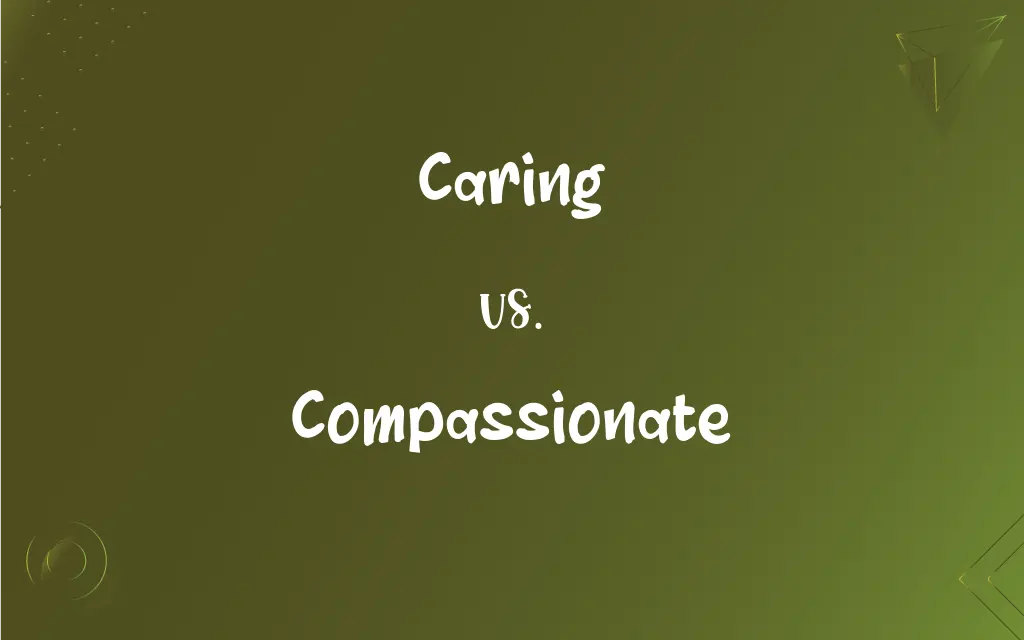Caring vs. Compassionate: What's the Difference?
Edited by Aimie Carlson || By Janet White || Updated on September 25, 2023
"Caring" refers to the act of showing kindness and concern for others, while "Compassionate" denotes a deep empathy and understanding for another's suffering or hardship.

Key Differences
"Caring" and "Compassionate" both describe qualities of empathy and concern for others, yet with nuanced differences. "Caring" primarily emphasizes the action or behavior of being attentive and considerate. For instance, a "Caring" person might be attentive to the needs of others, offering help when someone is struggling, or simply lending a listening ear.
"Compassionate," on the other hand, delves deeper, tapping into a profound sense of empathy and understanding for another's plight or suffering. A "Compassionate" individual not only recognizes the struggles of others but feels a heartfelt desire to alleviate that pain or distress. This emotional resonance goes beyond mere acknowledgment.
Moreover, while "Caring" can be expressed in day-to-day, sometimes superficial actions, "Compassionate" often denotes a more profound, enduring sentiment. A "Caring" gesture might be making someone breakfast, whereas a "Compassionate" gesture could be supporting a friend through a period of grief.
Functionally, "Caring" can describe both the disposition and the action, making it slightly broader in application. "Compassionate" typically speaks to a deep-rooted quality of character, a genuine sensitivity towards the suffering of others. This distinction makes "Compassionate" a more specific and intense form of "Caring."
Comparison Chart
Basic Definition
Displaying kindness and concern for others.
Having deep empathy and understanding for another's suffering or hardship.
ADVERTISEMENT
Depth of Emotion
Can be surface-level or profound.
Typically profound and deep-rooted.
Scope of Application
Describes both disposition and action.
Speaks more to a quality of character.
Contextual Usage
Often used for everyday acts of kindness.
Used to describe empathy during significant struggles or distress.
Grammatical Function
Can function as an adjective or noun ("a caring individual" or "showing caring").
Primarily an adjective ("a compassionate person").
Caring and Compassionate Definitions
Caring
Showing concern for others.
Her caring attitude made her friends feel valued.
ADVERTISEMENT
Compassionate
Feeling or showing sympathy for those who are suffering.
She was compassionate toward the homeless.
Caring
Offering help and support.
The community's caring spirit was evident in times of crisis.
Compassionate
Having a deep empathy.
His compassionate nature was known to all.
Caring
Being attentive to needs.
With her caring approach, she noticed every detail.
Compassionate
Being sensitive to the hardships of others.
Doctors should be both skilled and compassionate.
Caring
Demonstrating affection or love.
A mother's caring touch is irreplaceable.
Compassionate
Desiring to alleviate pain or distress.
Compassionate volunteers are needed at the shelter.
Caring
Feeling and exhibiting concern and empathy for others.
Compassionate
Demonstrating a profound understanding of another's plight.
He offered a compassionate ear during my struggles.
Caring
(of a person) Kind, sensitive, or empathetic.
She's a very caring person; she always has a kind word for everyone.
Compassionate
Feeling or showing compassion; sympathetic.
Caring
Present participle of care
Compassionate
Granted to an individual because of an emergency or other unusual circumstances
Compassionate military leave.
Caring
The act of one who cares.
Compassionate
To pity.
Caring
A loving feeling
Compassionate
Having, feeling or showing compassion (to or toward someone).
Caring
Showing a care;
A caring mother
Compassionate
Given to someone as an exception because of a family emergency or a death in their family.
Compassionate leave; a compassionate visa
Caring
Having or displaying warmth or affection;
Affectionate children
Caring parents
A fond embrace
Fond of his nephew
A tender glance
A warm embrace
Compassionate
(obsolete) Inviting or asking for pity.
Caring
Feeling and exhibiting concern and empathy for others;
Caring friends
Compassionate
To feel compassion (for someone or with regard to something); to regard (someone or something) with compassion.
Caring
Displaying kindness.
His caring gesture warmed my heart.
Compassionate
Having a temper or disposition to pity; sympathetic; merciful.
There never was any heart truly great and generous, that was not also tender and compassionate.
Compassionate
Complaining; inviting pity; pitiable.
Compassionate
To have compassion for; to pity; to commiserate; to sympathize with.
Compassionates my pains, and pities me.
Compassionate
Share the suffering of
Compassionate
Showing merciful compassion;
Sparing the child's mother was a compassionate act
Compassionate
Showing or having compassion;
Heard the soft and compassionate voices of women
Compassionate
Showing recognition of unusually distressful circumstances;
Compassionate leave
Considered for a compassionate discharge because of domestic difficulties
FAQs
Are "Compassionate" people always "Caring"?
Generally, someone described as "Compassionate" will also exhibit "Caring" behaviors.
Can "Caring" be temporary or situational?
Yes, "Caring" can be expressed in momentary or specific situations.
Can someone be "Caring" without being "Compassionate"?
Yes, one can show caring gestures without the deep empathy denoted by "Compassionate."
Is "Caring" more about action, and "Compassionate" about emotion?
Broadly, yes. "Caring" often emphasizes action, while "Compassionate" highlights deep empathy.
Which word describes a deeper level of empathy?
"Compassionate" typically indicates a deeper level of empathy than "Caring."
Can "Caring" be superficial?
It can be. "Caring" can range from deep concern to surface-level gestures of kindness.
Does being "Compassionate" require action?
Not necessarily. One can feel compassion without acting on it, though it often leads to action.
Does "Compassionate" always relate to deep suffering?
Often, but it can also relate to understanding and empathy in various contexts.
Can businesses or organizations be described as "Caring" or "Compassionate"?
Yes, both terms can describe the ethos or practices of entities, not just individuals.
Which term is broader in scope?
"Caring" is broader, as it can describe both a disposition and a range of actions, whereas "Compassionate" is more specific to deep empathy and understanding.
Can a gesture be both "Caring" and "Compassionate"?
Absolutely, especially if it demonstrates both kindness and deep empathy.
Is "Caring" always positive?
Typically, but it depends on context. For instance, "over-caring" might be seen negatively.
Is "Compassionate" always about human-to-human interactions?
No, one can be compassionate towards animals, the environment, or various causes.
Is "Compassionate" used in medical or therapeutic contexts?
Yes, professions that deal with suffering or healing often emphasize compassion.
Can you learn to be more "Caring" or "Compassionate"?
Yes, with self-awareness and effort, one can cultivate both qualities.
About Author
Written by
Janet WhiteJanet White has been an esteemed writer and blogger for Difference Wiki. Holding a Master's degree in Science and Medical Journalism from the prestigious Boston University, she has consistently demonstrated her expertise and passion for her field. When she's not immersed in her work, Janet relishes her time exercising, delving into a good book, and cherishing moments with friends and family.
Edited by
Aimie CarlsonAimie Carlson, holding a master's degree in English literature, is a fervent English language enthusiast. She lends her writing talents to Difference Wiki, a prominent website that specializes in comparisons, offering readers insightful analyses that both captivate and inform.































































